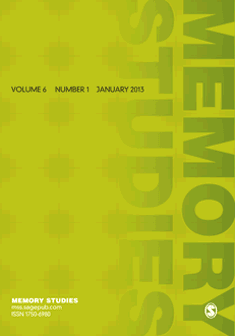
Memory Studies
Scope & Guideline
Connecting Cognitive Insights with Cultural Contexts
Introduction
Aims and Scopes
- Interdisciplinary exploration of memory:
The journal emphasizes the intersectionality of memory studies with fields such as history, sociology, psychology, cultural studies, and political science, allowing for a comprehensive understanding of how memory operates across different domains. - Focus on collective and cultural memory:
A significant portion of the research published examines how collective memory shapes societal identities and community narratives, particularly in the context of postcolonialism, war, and trauma. - Investigation of memory politics:
The journal addresses the ways in which memory is politicized and used as a tool for social justice, activism, and reconciliation, often highlighting underrepresented voices and narratives. - The role of digital memory:
With the rise of technology, the journal explores how digital platforms influence memory formation and dissemination, including the impact of social media on collective remembrance. - Queer and feminist perspectives:
The journal highlights the importance of queer and feminist frameworks in understanding memory, examining how gender and sexuality intersect with narratives of remembrance and identity. - Ethical considerations in memory studies:
Ethical implications of memory practices and representations are a recurrent theme, particularly in relation to historical injustices and the responsibilities of remembrance.
Trending and Emerging
- Digital and virtual memory:
There is an increasing emphasis on how digital technologies and social media platforms shape collective memory, particularly in light of events like the COVID-19 pandemic and social movements. - Decolonial and intersectional memory practices:
The journal is increasingly featuring research that examines memory through decolonial lenses, addressing issues of race, gender, and sexuality in the context of historical and contemporary injustices. - Activism and memory:
Emerging themes focus on the role of memory in social movements and activism, exploring how memories of past injustices inform current struggles for justice and recognition. - Emotional and affective dimensions of memory:
Research exploring the emotional aspects of memory, including trauma, grief, and resilience, is gaining traction, reflecting a deeper understanding of how memory impacts individual and collective identities. - Global and transnational memory:
There is a growing interest in exploring memory across borders, highlighting how global events and migrations influence memory practices and narratives.
Declining or Waning
- Traditional historical narratives:
While historical memory remains a crucial aspect of the journal, there is a noticeable decline in articles focusing solely on traditional narratives of history without engaging with contemporary issues or interdisciplinary approaches. - Static representations of memory:
Research that approaches memory as a fixed concept, rather than a dynamic and contested process, has become less frequent, indicating a shift towards more fluid and complex understandings of memory. - Overemphasis on single-national perspectives:
The journal has seen a reduction in studies that focus exclusively on national memory without considering transnational or comparative contexts, reflecting a broader trend towards global perspectives in memory studies. - Limited focus on archival practices:
While archival memory remains important, there is a waning interest in purely archival studies without critical engagement with the implications of memory politics and representation. - Narrowly defined memory practices:
Themes centered on traditional forms of memory practices, such as monuments or commemorations, are becoming less dominant as researchers explore more innovative and varied forms of memory expression.
Similar Journals
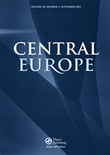
Central Europe
Navigating the Cultural and Political Landscapes of Central EuropeCentral Europe is a peer-reviewed journal published by Routledge Journals, Taylor & Francis Ltd, focusing on the interdisciplinary exploration of the cultural, political, and social dynamics within Central European countries. Since its inception in 2003, the journal has become a platform for the dissemination of high-quality research, offering vital insights into the region's complex narratives through studies in Arts and Humanities, Cultural Studies, Political Science, and Sociology. Despite currently holding a Q4 quartile ranking in multiple categories, the journal serves as an essential resource for researchers and professionals seeking to enrich their understanding of Central Europe's multifaceted contexts. Published in the United Kingdom, it presents opportunities for both established and emerging scholars to contribute to the discourse on contemporary issues and foster an academic community. Access to the journal is available through institutional affiliations and purchases, making it a crucial outlet for discussion and engagement in this evolving academic landscape.
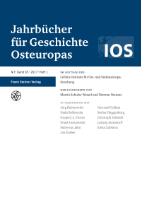
JAHRBUCHER FUR GESCHICHTE OSTEUROPAS
Charting the Course of Eastern Europe's Historical EvolutionJAHRBUCHER FUR GESCHICHTE OSTEUROPAS, published by FRANZ STEINER VERLAG GMBH, is a prominent academic journal dedicated to the exploration of Eastern European history. With its inception dating back to 1978, this journal has consistently provided a platform for scholarly discourse, contributing significantly to the understanding of the region's complex historical narratives. While the journal is not open access, it holds a solid reputation within the academic community, positioned in the Q4 quartile in history as per the 2023 category rankings, and stands at Rank #1636 within the Scopus Arts and Humanities History ranking. The convergence of its publication years throughout the decades emphasizes a long-standing commitment to historical research, thereby making it an essential resource for researchers, professionals, and students interested in Eastern European studies. Explore the intricate dynamics of historical events and cultural developments that shape Eastern Europe through this invaluable periodical.
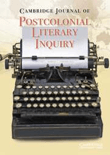
Cambridge Journal of Postcolonial Literary Inquiry
Fostering innovative insights into postcolonial contexts.Welcome to the Cambridge Journal of Postcolonial Literary Inquiry, a leading academic journal published by Cambridge University Press, dedicated to exploring the intricate intersections of postcolonial studies, literature, and history. With its ISSN 2052-2614 and E-ISSN 2052-2622, this journal has emerged as a vital resource for researchers, professionals, and students interested in the evolving narratives and theoretical frameworks shaped by postcolonial contexts. Operating since 2014 and spanning until 2024, it holds a commendable position in the academic community, reflected in its Scopus rankings, including a 76th percentile in Literature and Literary Theory. While the journal does not provide open access options at this time, it offers comprehensive insights that contribute significantly to the discourse surrounding cultural studies and historical perspectives. With categories in the Q3 and Q2 quartiles for Cultural Studies and Literature, it remains a crucial space for innovative scholarship, fostering intellectual engagement with the themes of identity, power, and resistance represented in postcolonial literature.

Dialog so Vremenem-Dialogue with Time
Advancing Scholarly Conversations Across EpochsDialog so Vremenem - Dialogue with Time is a prestigious academic journal published by the Russian Society for Intellectual History, focusing on the intricate interplay between historical narratives and philosophical thought. With its ISSN 2073-7564, the journal has established a significant presence in the scholarly community since its inception in 2016. It is categorized in the Q2 quartile for History and Q3 for Philosophy, reflective of its critical engagement with intellectual heritage and contemporary issues. Although not currently an open-access journal, it aims to provide valuable insights into the evolution of thought across different epochs, making it an essential resource for researchers, professionals, and students alike. The journal's contributions are recognized within Scopus, ranking at a notable percentile, which underscores its relevance and impact in the fields of Arts and Humanities. With its ongoing commitment to fostering dialogue in intellectual history, Dialog so Vremenem remains a vital platform for scholarly exchange and exploration of time’s influence on ideas.

Comparative Southeast European Studies
Connecting Scholars and Ideas in Southeast European StudiesComparative Southeast European Studies, published by WALTER DE GRUYTER GMBH, is an esteemed open-access journal that has been contributing to scholarly discourse since its inception in 2021. With its ISSN 2701-8199 and E-ISSN 2701-8202, the journal is dedicated to the multidisciplinary examination of Southeast European societies, cultures, and economies. The journal strives to foster a nuanced understanding of historical and contemporary issues through an array of perspectives, appealing to researchers, professionals, and students alike. While it currently resides in Q4 for several categories including Anthropology, Economics, and Political Science, it maintains a robust platform for innovative research and dialogue within the region. Situated in Germany, this journal serves not only as a repository of knowledge but also as a catalyst for future scholarly endeavors, with the aim to elevate the discourse surrounding Southeast Europe during the converging years of 2021 to 2024. Its commitment to open access ensures that critical research is readily available, inspiring collaboration and engagement across academic and professional communities.
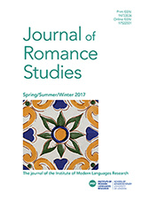
Journal of Romance Studies
Exploring the Depths of Romance Languages and CulturesJournal of Romance Studies, published by Liverpool University Press, is a significant forum for scholarly discourse within the realms of cultural studies, linguistics, literature, and the visual and performing arts. With an ISSN of 1473-3536 and an E-ISSN of 1752-2331, this journal aims to bridge various interdisciplinary approaches, fostering insights into the richness of Romance languages and their cultural contexts. Although it holds a Q4 designation across several categories in the 2023 rankings, the journal continues to serve as a platform for emerging researchers and established scholars alike to contribute to the evolving narrative of Romance studies. Published annually, it ensures access to a diverse body of research that underpins the understanding and critique of Romance languages and cultures. Join a community committed to exploring these vital areas of inquiry, as the journal actively engages with contemporary issues shaping the landscape of Romance studies.

Cahiers de Civilisation Espagnole Contemporaine-De 1808 Au Temps Present
Unveiling the Tapestry of Contemporary SpainCahiers de Civilisation Espagnole Contemporaine-De 1808 Au Temps Present, published by UNIV PARIS X-PARIS-NANTERRE, is a leading academic journal dedicated to the exploration and analysis of contemporary Spanish civilization from 1808 to the present day. With an emphasis on interdisciplinary approaches, this journal serves as a platform for researchers, professionals, and students interested in the cultural, social, political, and historical aspects of Spain's evolution over the centuries. Since adopting an Open Access model in 2007, it has made significant strides in disseminating knowledge, thereby contributing to a broader understanding of Spanish studies in the global academic community. The journal's rigorous peer-review process ensures high-quality scholarship, making it a vital resource for anyone seeking to deepen their expertise in contemporary Spanish issues. Its headquarters are located at 200 Avenue Republique, Nanterre 92001, France, signaling its strong connection to the academic traditions of Paris and its commitment to fostering scholarly discourse.

MEMORY & COGNITION
Connecting Research to Real-World CognitionMEMORY & COGNITION is a premier journal published by SPRINGER, dedicated to advancing the understanding of cognitive processes related to memory. Established in 1973, this esteemed journal covers a wide range of topics within the fields of experimental and cognitive psychology, neuropsychology, and physiological psychology, cementing its status as a leading voice in the arts and humanities. With an impressive impact factor and a consistent Q1 ranking across multiple categories, MEMORY & COGNITION attracts high-quality research that elucidates the intricacies of memory function and cognition. The journal is nestled within the competitive landscape of academic publishing in the United States and maintains robust accessibility options, inviting both quantitative and qualitative analyses from researchers, professionals, and students alike. By fostering interdisciplinary dialogue and collaboration, this journal plays a pivotal role in shaping the future of cognitive research, making it an invaluable resource for its readership.

Tempo e Argumento
Exploring the Depths of Historical DiscourseTempo e Argumento is a distinguished academic journal dedicated to the field of History, published by the Universidade do Estado de Santa Catarina (UDESC), Brazil. Since its inception in 2009, this Open Access journal has aimed to foster scholarly dialogue and disseminate research findings that contribute to historical discourse and understanding. With a commendable Q1 classification in the 2023 category quartiles and a current rank of #940 in Scopus for Arts and Humanities - History, it stands out for its commitment to high-quality academic output. The journal invites contributions from diverse perspectives, promoting innovative discussions among researchers, professionals, and students alike. Scholars can find the journal's articles freely accessible, enhancing the visibility and impact of their work. For those interested in the evolving narratives of history, Tempo e Argumento provides an essential platform for exploration and inquiry.
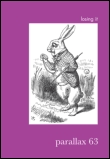
Parallax
Advancing Critical Discourse in Arts and HumanitiesParallax is an esteemed scholarly journal published by Routledge Journals, Taylor & Francis Ltd, focusing on critical studies in Cultural Studies, Literature and Literary Theory, Philosophy, and Visual Arts and Performing Arts. Established in 1995 and operating from the United Kingdom, it has carved out a niche as a vital resource for researchers, professionals, and students alike, contributing notable insights and fostering discourse within these dynamic fields. With its rigorously peer-reviewed articles, Parallax enjoys a solid reputation, evidenced by its Q2 ranking in multiple categories in 2023 and impressive Scopus statistics that position it among the top percentile of its peers. The journal's commitment to interdisciplinary engagement invites scholars to explore the intersections of culture, art, and philosophy, making it an essential reference point for contemporary academic inquiry.